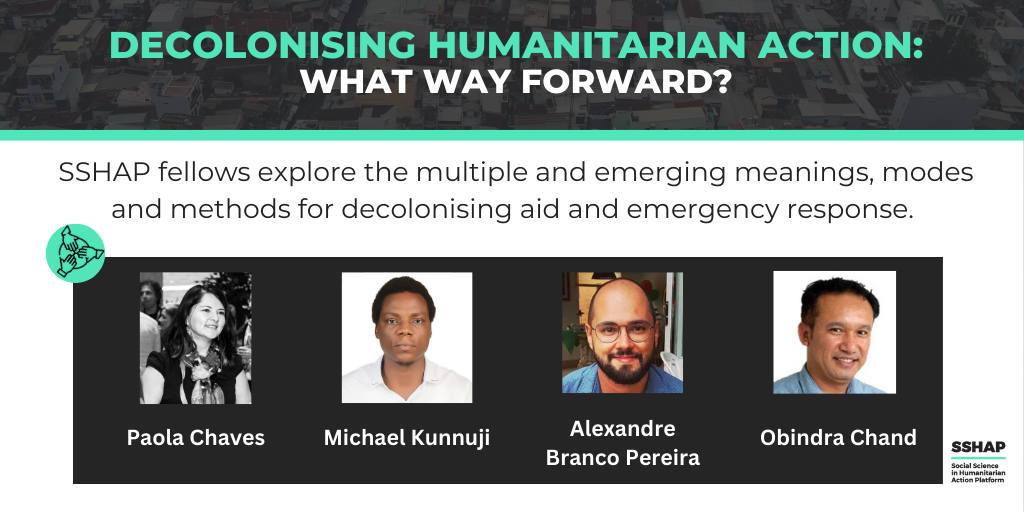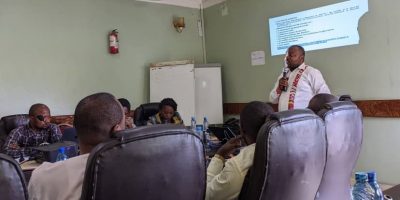As Tammam Aloudat and Themrise Khan write, ‘Decolonising humanitarian aid has imposed itself on the humanitarian debate over the past few years… But the how, to what extent, and with what means is not yet clear’.
Our recent SSHAP webinar ‘Decolonising Humanitarian Action: A Multiplicity of Meanings, Modes & Methods’ aimed to examine just that – to get beyond the buzzwords and explore the multiple and emerging meanings, modes and methods for decolonising aid and emergency response. In this blog post, the webinar panellists share their reflections on the question: How can we decolonise humanitarian action given the multiplicity of meanings, modes and methods?
Obindra B. Chand, SSHAP Fellow, 2022
Decolonisation is a multifaceted concept. As a critical approach, it helps us to identify the roots of inequality as they stem from the colonial-era at multiple levels. This has led to the examination, through a decolonial lens, of many aspects of humanitarian action, ranging from policy design to community consultation during disaster response. However, it is challenging to agree on how humanitarian action can be decolonized, conceptually, practically and contextually. It raises many questions regarding operationalizing and implementing humanitarian action. Who leads and who decides? How is power being shared? How are resources being deployed? Who gets resources and who does not? Who and why are these connected with the wider paradigm, pattern, and system? The answers to these questions are neither easy nor universal. There is no one-size-fits-all solution.
My view is that practically decolonising humanitarian action should include trusting local leadership, engaging in meaningful engagement with local communities, alongside marginalised and vulnerable populations such as people with disabilities, investing in local innovation, and strengthening local response systems. This would privilege the ‘lived’ experience of the affected/vulnerable communities and open opportunities for co-design of culturally appropriate, contextually relevant and socially acceptable humanitarian action with them. In addition to developing a sense of ownership and sustainability and efficiency of the system, such initiatives could contribute to a paradigm shift in a real sense — from a charity-based to an equity-based approach to humanitarian action that acknowledges diversity, inclusivity and community involvement in the different stages of humanitarian responses.
Alexandre Branco-Pereira, SSHAP Fellow, 2023
Emergencies and disasters are frequently used as opportunities for the withdrawal of rights, which responds to a colonial, neoliberal and white supremacist configuration of global politics. Although emergencies and disasters – disruptions that break the normal course of life – are usually referred to when talking about humanitarian action, coloniality is a structural pattern of distribution of power forcefully established centuries ago by European countries, and it continues to have a significant impact on the way former colonies are structured today .
This way, it is important to acknowledge that humanitarian crises must never be dissociated from their colonial contexts. Decolonising humanitarian action demands addressing local and global political issues if we aim to reorganise the power dynamics at play. Some guiding questions may help: How can structural elements of emergencies and disasters be continually taken into account and addressed – both to prevent future crises, and also to ensure rights are not violated during emergency responses? How do we ensure we do not dismiss the social, political and economic contexts in which the response will take place?
Another useful approach is to establish systematic consultation processes with affected communities. Engaging communities in designing the actions that will affect their lives, especially if it is not done as a way to ease ‘resistance’ towards figures of power, is central to producing humanitarian action that takes all actors engaged in it as political equals. In this way, affected communities can participate in these designing processes with more relevance than other outsider actors not acquainted with their contexts. This has the potential to redistribute power.
Michael Kunnuji, SSHAP Fellow 2022
Decolonisation means different things to different people, and in different contexts. One question that has failed to go away wherever the concept of decolonising humanitarian action is discussed is, the ‘how’ question.
The call for decolonisation needs to be authentic and it needs to come from low- and middle-income countries (LMICs). At present, the idea resonates more with high-income country (HIC) actors, albeit, often with those with roots in LMICs. At what point will actors from and in LMICs begin to drive the movement? The call may sound more authentic and organic when those at the frontlines in LMICs begin to take the lead in determining what decolonising humanitarian action means to them and how it can best be done. For instance, calls to discontinue the provision of funding that are perceived to have ‘strings attached’ may not be acceptable to those whose lives presently depend on these provisions. To decolonise humanitarian action is to centre and to amplify the suppressed voices of those most in need of humanitarian action. At present, academics and practitioners in the global North, even those of LMIC origin, are the loudest and the most centred. This has to change.
Coloniality itself is strongly linked to neoliberal capitalism at the global level – an economic system that privileges HICs at the expense of LMICs. The common saying ‘he who pays the piper calls the tune’ has implications for humanitarian action. LMIC governments need to prioritise investment in local development. This way, they can call the tune. There is a greater chance that humanitarian action will be more equitable, more just, and less reflective of white supremacy if it is locally funded.
Paola Chaves, SSHAP Fellow 2022
For me, this question has two possible answers. The first possible answer relates to decolonising strategies and practices in humanitarian interventions. Interventions could go beyond participatory methods to the complete co-design and co-implementation of interventions, in which the role of local people is central in decision-making. In this scenario, humanitarian aid organisations would have a coordinating role, like a bridge, or a facilitating role (e.g. attracting donors and collecting money), while in the rest of the process, they would relinquish power. Experts would have to discuss their knowledge with local people to understand to what extent their knowledge applies to each case. This relates to a concept called the ecology of knowledge in which different knowledges are recognised and the hierarchy of these knowledges is defined according to peoples’ needs and priorities, instead of assuming that Western scientific knowledge is the most relevant.
The second possible answer deals with issues of historical justice and reparations. This is more radical, and therefore very difficult to implement. From this perspective, humanitarian ‘aid’ is a moral obligation that requires an understanding of justice and solidarity and, also, the historical roots of cause and effect within any humanitarian crisis. Moreover, it should address the political implications of any humanitarian interventions or the lack of them. Hence, even the name should be different, for instance, humanitarian justice instead of humanitarian aid.
Directions for decolonising humanitarian action
The reflections above outline a multiplicity of directions oriented toward a shared commitment to humanitarian action that is more relevant, equitable, and just. These reflections collectively conceive of ‘decolonizing humanitarian action’ as centring the agency and leadership of affected communities and decentralising (and rebalancing) power and resources as well as challenging colonial power relations. This includes not only consultation but co-design of humanitarian action with communities affected by humanitarian crises, centring and amplifying their ‘everyday’ actions and experiences and knowledges and expertise.
At the same time, the reflections outline some contrasting (yet complementary) directions for decolonizing humanitarian action. For example, while Obindra, Alexandre, and Paola call for engagement and co-design with ‘local’ communities, Michael centres the role of governments in transforming humanitarian action. And while Alexandre and Michael draw attention to the global, colonial contexts of both humanitarian crises and responses, Paola adds to this by considering questions of reparations and historical justice.
What way forward?
Engaging with the question of how to decolonize humanitarian action requires, in turn, attention to numerous other questions, as highlighted by the responses above: How is power shared and how are resources distributed? How are the wider structural and historical contexts of humanitarian action addressed? Whose knowledges are recognized and centred? And who drives the movement to ‘decolonize’ humanitarian action?





